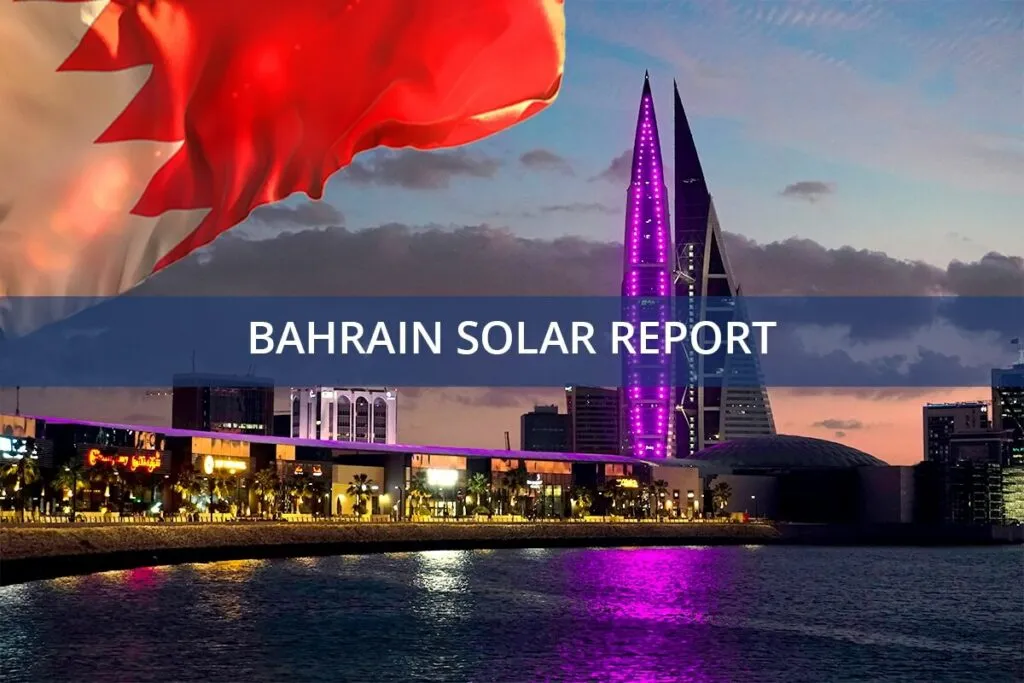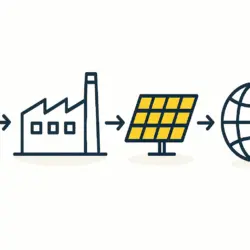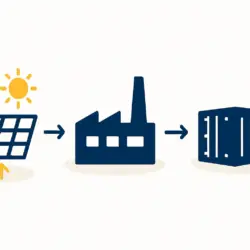Bahrain is set to build the world’s largest rooftop solar plant by 2025, with a total capacity of 123 megawatts peak (MWp). Adding over 189,900 solar panels across 14 industrial sites, the project will generate approximately 200 million kilowatt-hours of clean energy annually, cutting carbon emissions by about 90,000 metric tons.
World’s Largest Bahrain rooftop solar Plant
Bahrain is taking a monumental step towards a sustainable future with plans to build the world’s largest rooftop solar project, slated for completion by 2025. The project will boast a total capacity of 123 MWp and will be located primarily in Salman Industrial City in Hidd. This ambitious initiative is a cornerstone of Bahrain’s national renewable energy strategy and its commitment to achieving Net Zero by 2060.
The expansive project will cover 707,000 square meters across 14 different sites, comprising ten rooftop installations and four ground-mounted solar arrays. It will utilize more than 189,900 solar panels in total. A standout feature is a record-breaking single-site rooftop plant with a capacity of 50 MWp, installed on a 262,000-square-meter stockyard shed. Once operational, the entire project is expected to generate 200 million kWh of clean electricity annually, enough to power thousands of households and significantly reduce the country’s carbon footprint.
The solar plant is projected to reduce carbon emissions by 90,000 metric tons per year, a major contribution to the kingdom’s climate goals. Beyond its environmental impact, the project is also expected to create hundreds of jobs during its construction and operational phases.
A New Era for Renewable Energy in Bahrain rooftop solar
This rooftop solar plant marks a major milestone for Bahrain’s renewable energy sector. The project was unveiled at the Gateway Gulf 2025 investment forum, signaling the nation’s readiness to lead in clean energy innovation. The scale of this development is expected to attract more investment and bolster the local renewable energy ecosystem, which is critical for achieving Bahrain’s ambitious energy goals.
The project is being developed through a strategic collaboration between Foulath Holding, Bahrain’s leading industrial steel company, and Yellow Door Energy, a prominent solar developer in the region. It is structured under a Power Purchase Agreement (PPA), where Yellow Door Energy will finance, design, construct, operate, and maintain the plant. This model allows Foulath Holding to benefit from clean energy without any upfront investment, enhancing the competitiveness of Bahrain’s steel industry. This project adds to the growing landscape of Bahrain solar panel manufacturing and large-scale installations.
Bahrain’s Commitment to Sustainability through rooftop solar
Bahrain has been making significant strides in recent years to transition to a more sustainable energy system. The country has set ambitious renewable energy targets and has been actively seeking investments to diversify its energy mix. In line with its Economic Vision 2030, the kingdom aims to generate 5% of its energy from renewable sources by 2025 and has committed to achieving carbon neutrality by 2060.
This solar plant is a major step forward in achieving these goals. By powering a significant portion of its industrial sector with clean energy, Bahrain is not only reducing its reliance on fossil fuels but also stimulating economic growth. The project showcases a strong domestic demand for renewables, which can help grow the GCC market demand for Bahrain-made solar panels.
A Model for Other Countries: Bahrain rooftop solar
The Foulath Holding and Yellow Door Energy project is not only a milestone for Bahrain but also serves as a model for other nations looking to accelerate their transition to a sustainable energy system. The project demonstrates the immense potential of rooftop solar to generate clean energy on an industrial scale, a concept detailed in the global solar report.
Rooftop solar is a particularly attractive option for countries with limited land resources, like Bahrain. By utilizing existing industrial rooftops, the project maximizes land efficiency. Furthermore, it highlights the crucial role of public-private partnerships and innovative financing models like the PPA in developing large-scale renewable energy projects. Understanding the basics of solar panel manufacturing is key to appreciating the complexity and scale of such an undertaking.
Overall, this landmark solar plant is a significant leap forward for Bahrain and the global renewable energy sector. It is poised to deliver a positive impact on the environment, the economy, and the country’s long-term energy security. To learn more about the intricacies of bringing such projects to life, from sourcing solar panel raw materials to a full solar panel manufacturing plant cost breakdown, dive deeper into the world of solar energy.
Ready to become a solar expert? Enroll in our free e-course to get started.



